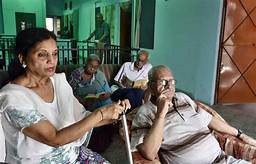Like Japan, India May Have To Think Of A Minister for Loneliness

Does India need a Minister for Loneliness?
On the face of it, the idea may seem a bit hilarious as the common view is that the problem here seems to be the other way round — one of lack of privacy and abundance of people staying together in Indian family set-ups.
However, this is a superficial view because recent studies have shown that feeling of loneliness is on the rise in countries like India, China, Brazil where living alone is becoming a common phenomenon in urban set-ups, that is common in highly-developed western countries like US, Scandinavia, Japan, Germany, France, UK, Australia, Canada.
According to a study, an estimated 6% of elderly citizens in India live alone and 10%-20% of them suffer from mental desolation and loneliness.
According to another study with a sample size of 10,000, it was found that nearly 83.71% of above-60 people were isolated and experienced loneliness. There was a difference in urban and rural areas. Whereas in urban areas, nearly 90% elderly people felt isolated, the figure was around 78% in rural areas.
Japanese Prime Minister Yoshihide Suga recently inducted a Minister of Loneliness in his Cabinet in view of the growing cases of loneliness and its critical after-effects like suicide.
Going back a little further, it was in 2018 that Britain became the first country to appoint a Minister in charge of Loneliness.
The Jo Cox Commission had reported in 2017 that more than 9 million people in Britain often or always feel lonely and urged for a minister to be made in charge. And so Tracey Crouch, minister for Sport and Civil Society was also made minister for Loneliness.
Britain’s Loneliness ministry has been funding programmes like “a week” dedicated to loneliness awareness to lessen the stigma associated with loneliness, development of innovative digital technological solutions to connect lonely people, community projects to tackle loneliness, training younger people to work with older people on digital technology.
The problem of loneliness had become particularly acute during the COVID-19 pandemic in Japan.
Tetsushi Sakamoto, Japan’s minister in charge of combating the nation’s falling birth rate and revitalizing regional economies, has now been given the additional portfolio of Loneliness.
Japan has established a Task Force to investigate the impact of loneliness and suggest measures to tackle the issue.
What had further added a sense of urgency to the issue is the rising trend in the number of suicides in Japan after a gap of many years, particularly among the women and youth. According to preliminary figures released by the National Police Agency, 20919 people took their own lives in 2020, up 750 from the previous year – an annual rise seen after 10 years.
Loneliness can also be a reason to cause mortality. A 2018 report by global health organization Cigna concluded that loneliness “has the same impact on mortality as smoking 15 cigarettes a day, making it even more dangerous than obesity.”
Okamoto Junko, in her book ‘Japan’s Middle-aged Men — The Loneliest People in the World’, has said: “A generation of men brainwashed into working their butts off nonstop only have work to derive pleasure from, and base their identities on, and are often too busy to find themselves hobbies or new communities to be part of.”
Those living alone in Japan, according to a study, is likely to rise to nearly 40% in 2040, almost double the level seen in 1970.
While globally 800,000 people die by suicide every year according to World Health Organization, the number in India alone is above 1,00,000. But one must remember for each suicide, there are about 20 suicide attempts. This definitely requires everyone to sit up and take note.
World Health Organization puts “loneliness” as one of the risk factors leading to suicide.
The National Crime Records Bureau (NCRB) of India, too, puts ‘sense of isolation’ or loneliness as one of the reasons for suicide.
According to NCRB, 139,123 suicides were reported in the country during 2019 — an increase of 3.4% from last year.
In India, during the lockdown period, many people apparently committed suicide due to the fear of infection and loneliness. In this scenario, the elderly are particularly vulnerable as they are already susceptible to melancholy.
The total number of suicides in Odisha in 2019 was 4582. It was the lowest in the country (3.3%), compared to Maharashtra’s highest rate of 13.6%, though no survey was done to find out if loneliness caused anyone to commit suicide.
But Indian authorities in states and the Centre must address this critical issue of loneliness urgently to help a large section of its people and, if required, institute a Department of Loneliness or Minister for Loneliness.
It will be interesting to see who becomes India’s first Minister for Loneliness.
Also Read: COVID-19 Fallout: Japan Appoints ‘Minister For Loneliness’ After Rise In Suicides

Comments are closed.